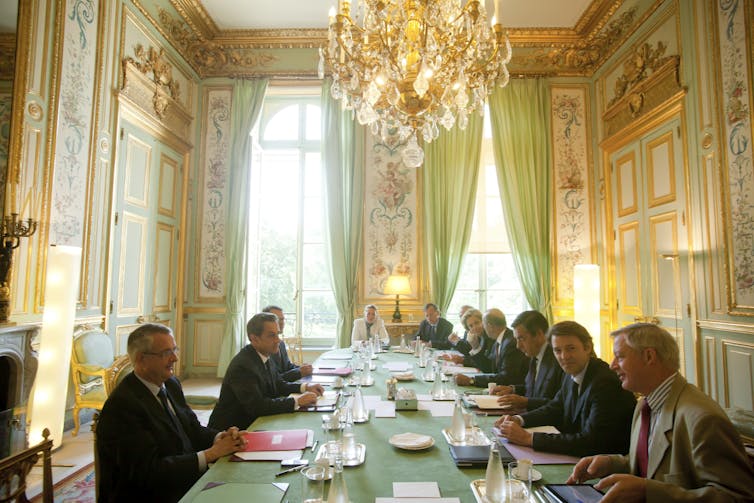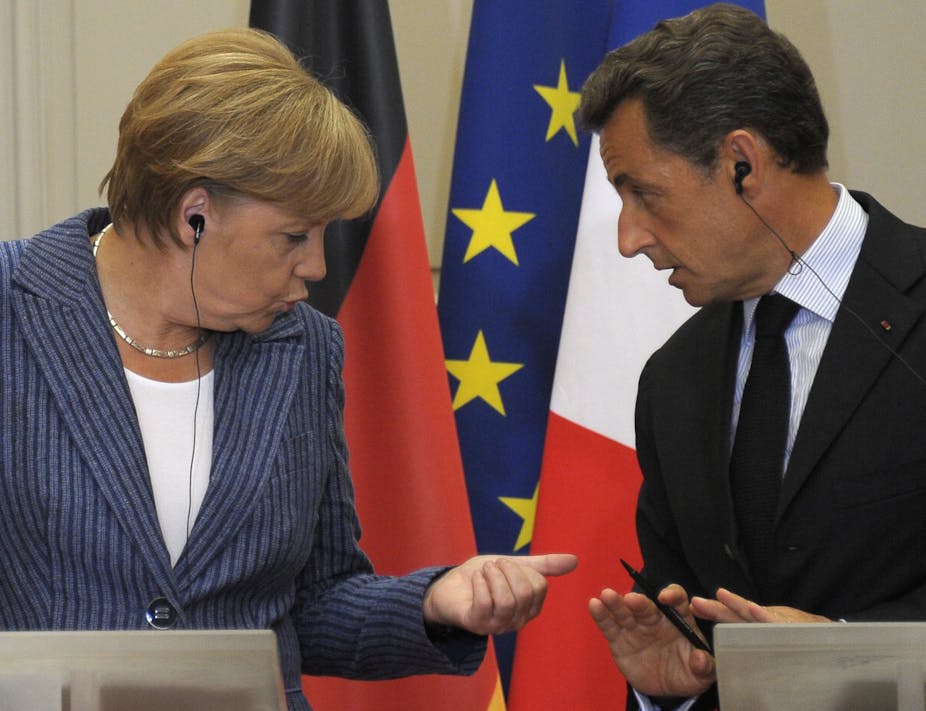German Chancellor Angela Merkel and French President Nicolas Sarkozy appear to hope their recent Summit will avoid further increasing Euro rescue fund, the European Financial Stability Facility (EFSF), or issuing joint Eurobonds.
Both measures are extremely unpopular in Germany, which sees itself as the financier of spendthrift southern Euro zone member countries.
Germans are only willing to pay with “their” money in “return” for strict austerity measures. And, as Merkel has said, Eurobonds would only be considered as last means.
The German Chancellor seems to believe that the Euro zone is not yet at the point where last resort measures need to be considered seriously.
Unfortunately, Mrs Merkel may be wrong.
Are we there yet?
There are a number of compelling reasons to back this. With Italy and Spain (and eventually France and Belgium) in peril, even a tripling or a quadrupling of the ESFS fund would not be sufficient.
And by providing such funds the debt crisis would surely arrive in Germany, too.
So far, imposed austerity measures have induced recessions in the debtor countries, Euro zone economic growth is flat and even in Germany zero growth was reported in the last quarter. All this makes it more difficult to grow out of the debts.

Financial markets and especially interbank markets are increasingly showing signs of resembling the conditions preceding the global financial crisis conditions - strongly suggesting that another banking crisis is just around the corner.
But this time it will hit the Euro zone countries when their public debt levels are much higher. This will leave much less room for rescuing operations.
Not the sole culprit
Germany sees excessive sovereign debts in some countries as the root of the problem. If this problem is addressed properly and solved then the crises should disappear.
But a flawed design, not excessive sovereign debts, makes the Euro zone vulnerable.
While excessive public debts in some countries have indeed been the trigger that started the trouble, it is an illusion to believe the crisis can be contained with imposed austerity and strict deficit rules alone.
Belgian economist Paul De Grauwe rightly reminds us the fundamental problem is the lack of a lender of last resort in the government bond market in the Euro zone.
Unlimited liquidity
A country with its own currency that borrows in its own currency always has a central bank that can provide unlimited liquidity. Hence, there is always an implicit guarantee that bondholders will be bailed out.
Like in deposit markets, the pure existence of the central bank as a lender of last resort to banks prevents a bank run – and thus a bail-out will not even be necessary.
With a debt-to-GDP ratio of more than 200%, Japan is more indebted than any problem country in the Euro zone.
Yet it is considered as a safe haven. Similarly, if the Euro zone would have a credible lender of last resort in the government bond market, sovereign debt crises could be avoided.
It is the lack of a lender of last resort in the Euro zone which makes in principle every country vulnerable – even Germany. But when Germany or France could also be attacked, who would then guarantee their debts and finance the EFSF?
And even if Germany would remain the safe haven, it still has neither the financial means nor the political will to bail out the rest of the Euro zone.
As the funds of the EFSF could never be big enough, a break-up of the Euro zone and re-introduction of national currency is thus the [ultima ratio](http://en.wikipedia.org/wiki/List_of_Latin_phrases_(U) financial markets will expect. Consequently, the attack can hit every Euro member country at any time.
The Euro is not simply facing debt crises of some member countries but a serious confidence crisis.

Convincing the market
What needs to be done? First and foremost, the confidence crisis must be overcome. There are only two ways left (except hope) to convince the markets:
A lender of last resort for the Euro zone. Unfortunately, the ECB rejects this role despite occasional interventions in government bond markets of problem debtors.
Centre for European Policy Studies Director of economic policy Daniel Gros suggests a different solution which could have the same effect but may be easier to accept.
He suggests the EFSF could be registered as a bank with unlimited access to ECB funds and thus fulfill the lender-of-last resort function.
Eurobonds for the Euro zone. They would not only solve the problems with sovereign debt crises, but also provide then a liquid and secure financial market. A simple solution is that all maturing debt of all Euro zone countries would be replaced by Eurobonds as suggested by Charles Wyplosz.
Establishing a lender-of-last-resort function is surely the cheapest, fastest and easiest way to solve the problem.
In the best case no cost will have to be borne by the taxpayers. Merkel may recall her courageous 100% guarantee of bank deposits in the midst of the financial crisis.
A bank run was avoided at no cost to the German taxpayers. In this respect, Eurobonds are second-best as borrowing costs for top-rated countries like Germany may increase and it may be time-consuming to provide the legal framework for issuing Eurobonds.

Stablising the Euro zone
Secondly, additional complementary measures are needed to bring the Euro zone to a new and stable governance equilibrium under these conditions:
• Sovereign debt and deficits need to be monitored strictly when a lender-of-last resort function and/or Eurobonds will be in place. Thus one can also read into the Merkel-Sarkozy proposal the first step in preparing Germany especially to accept a new governance structure. Or as Germany’s finance minister Wolfgang Schäuble said: “I rule out Eurobonds as long as member states conduct their own financial policies.”
• The Euro zone needs a joint economic institutional governance structure that monitors not only government debts but also competitiveness and banks.
• The Euro zone (and Europe) needs a single European banking market supervision authority. European banks in an increasingly integrated European banking market were and are still at the heart of the Euro crisis. A single banking market in general and a single currency in particular cannot provide efficiency and stability at the same time if the supervision remains nationally fragmented.
• The Euro zone (and Europe) needs light at the end of the tunnel. The austerity bias of the current strategies needs to be substituted by a medium to long-run view that aims at bringing the debt levels down over time without pushing the European economies deeper into a recession that already lures around the corner. This is also an area where Eurobonds could play a beneficial role.

The cost of “non-Europe”
Putting more and more money into the rescue fund EFSF is widely viewed as the cost of the Euro and at the heart of the increasing anti-Europe sentiments in many member countries. This is, however, not the cost of the Euro, but the cost of a flawed design of the Euro zone.
As we do not have an affordable chance to get out of the single currency project anymore, only the way forward remains.
When Europe was in a competitiveness crisis in the 1980s, the then-president of the European Commission, Jacques Delors, underpinned his ambitious single market project with a voluminous study called “The Cost of Non-Europe”. The Euro countries are today again facing tremendous “costs of non-Europe” in two respects:
• The costs of the current crisis strategy under a flawed single currency regime. • The “ opportunity cost”, that is, the foregone benefits of a new governance structure that could make the Euro zone much more attractive globally and could help to revive both Europe and the Euro zone.
Alternatives?
With a few but simple steps we could end throwing good money after bad money. Surely, some believe the role of the ECB and the “virtues” of austerity programs need to be adjusted to the new realities, but we are increasingly left with no alternatives – a phrase that Merkel likes to use when a drastic change in policies is introduced.
Then, however, European institutions would have to be adapted to the new circumstances. This calls for nothing less than a thorough revision of the European treaties in the spirit of eliminating the “cost of non-Europe”.
This will necessarily involve some losses in sovereignty for all member states.
Ready or not?
Is Europe ready for such measures? In fact, Europe has now to answer the question I have asked earlier in this forum: “How much national self-determination in exchange for effective Euro(pean) governance are the member states ready to give up in order to make European integration achievements work in rough times too?”
While a new European enthusiasm is encouraged, one should not forget to mention a serious flaw of both Delors’ single market project and the single currency project: both were predominantly the projects of European “elites”.
A “new deal for Europe” should be an inclusive project for all Europeans – in terms of economic benefits and in terms of political participation.

